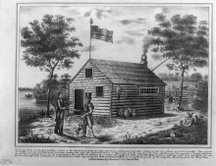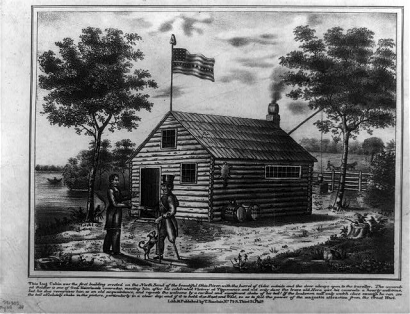
A political cartoon from the 1840 U.S. Presidential campaign, which offers several illustrations of the techniques described here. View a larger image. The description of the cartoon by the U.S. Library of Congress reads, in part: "A Whig campaign print, showing William Henry Harrison greeting a wounded veteran before a log cabin by a river. A coonskin is tacked to the side of the cabin, two barrels of hard cider stand by, and a farmer ploughs a field in the distance. The text below the image describes the scene: This Log Cabin 'was the first building erected on the North Bend of the beautiful Ohio River, with the barrel of cider outside and the door always open to the traveller.'" In the campaign, between the Whigs and Democrats, Democrats cast Harrison as provincial and out of touch — an old man who would rather "sit in his log cabin drinking hard cider" than attend to the duties of office. This was a reference to Harrison's having retired to his farm after his defeat in the campaign of 1836. In effect, Democrats were rewriting history by depicting Harrison's dignified retirement as a retreat into alcoholism. In response, Harrison and his vice presidential running-mate, John Tyler, adopted the log cabin and hard cider as campaign symbols to appeal to the common man, as depicted in the cartoon. It was in this campaign that the Whigs used the memorable slogan, "Tippecanoe and Tyler too." Tippecanoe was a nickname of Harrison, referring to a military victory he crafted as a general in 1811. Finally, to create distrust of the Democrats, the Whigs, in reference to the Panic of 1837 under the Democratic incumbent President Martin van Buren, took to referring to the President as "Van Ruin." Photo courtesy the U.S. Library of Congress American cartoon print filing series.
Creating distrust in oneself is easy — tell a few lies, originate a few nasty rumors, dishonor your commitments, and then get caught at it. But creating distrust in others — and getting away with it — takes real talent, because the obvious ploys often backfire. For instance, telling a lie about someone else might work for a while, but people might someday learn the truth, and when they do, they often realize where the lie came from.
To give people reasons to distrust someone else, and get away with it, you must be in the right place, with the right set of tools, and use a little bit of cleverness.
This essay isn't intended as a handbook for the ruthless, but it's written that way for clarity. I hope that when you sense yourself beginning to distrust someone, you'll suspend judgment until after you determine whether anyone is using any of these techniques, or anything similar. With that cautionary note, here are some methods for creating distrust of someone else. We'll call the target Tom.
- Withhold all good news
- Repeating any good news about Tom, his accomplishments, or his abilities undermines your goal. Never give your target anything of value for free.
- Raise questions
- Although questions aren't actually accusations, and therefore need no evidence, they can nevertheless have the effect of accusations. At every opportunity, raise questions about Tom's talents, his situation, his past, his intentions, or his prospects. If opportunities to raise questions don't arise, create some.
- Elevate competitors
- If any others can do what Tom can do, extol their capabilities. Elevating potential substitutes makes people comfortable with Tom's eventual disappearance or exclusion. Tom becomes less important.
- Characterize past events
- Minimize Tom's past accomplishments by re-interpreting or inventing history. The elements of the past most suitable for this purpose are those that reside mostly in people's memories, with a minimum of factual evidence to contradict your assertions.
- Exploit repetition
- Repeat your Although questions aren't actually
accusations, and therefore need no
evidence, they can nevertheless
have the effect of accusationsquestions about Tom, your assertions about his past, and your praise for his competitors at every opportunity. People need frequent reminding and re-enforcement before they can truly internalize your misrepresentations. - Craft a memorable slur
- Build a tight connection between the idea of Tom and reasons for distrusting him. A crisp, short slur that captures one or more of Tom's supposed negative attributes makes your campaign "sticky."
- Elevate the tempo
- Rapid execution of multiple techniques tends to overload Tom's ability to respond with defensive tactics. High tempo also saturates the audience's ability to process your charges and Tom's defenses. After all, everyone does have other things to do.
Most important, limit the effectiveness of Tom's defenses by refuting them in advance. Accuse him of harboring ill will towards you, and characterize his responses as evidence of his vengefulness and defensiveness. That should finish him off. Trust me. ![]() Top
Top ![]() Next Issue
Next Issue
Is every other day a tense, anxious, angry misery as you watch people around you, who couldn't even think their way through a game of Jacks, win at workplace politics and steal the credit and glory for just about everyone's best work including yours? Read 303 Secrets of Workplace Politics, filled with tips and techniques for succeeding in workplace politics. More info
See "When Over-Delivering Makes Trouble," Point Lookout for December 5, 2012, for an additional behavior that erodes trust.
Your comments are welcome
Would you like to see your comments posted here? rbrenaXXxGCwVgbgLZDuRner@ChacDjdMAATPdDNJnrSwoCanyon.comSend me your comments by email, or by Web form.About Point Lookout
 Thank you for reading this article. I hope you enjoyed it and
found it useful, and that you'll consider recommending it to a friend.
Thank you for reading this article. I hope you enjoyed it and
found it useful, and that you'll consider recommending it to a friend.
This article in its entirety was written by a human being. No machine intelligence was involved in any way.
Point Lookout is a free weekly email newsletter. Browse the archive of past issues. Subscribe for free.
Support Point Lookout by joining the Friends of Point Lookout, as an individual or as an organization.
Do you face a complex interpersonal situation? Send it in, anonymously if you like, and I'll give you my two cents.
Related articles
More articles on Workplace Politics:
 There Are No Micromanagers
There Are No Micromanagers- If you're a manager who micromanages, you're probably trying as best you can to help your organization
meet its responsibilities. Still, you might feel that people are unhappy — that whatever you're
doing isn't working. There is another way.
 Ethical Influence: I
Ethical Influence: I- Influencing others can be difficult. Even more difficult is defining a set of approaches to influencing
that almost all of us consider ethical. Here's a framework that makes a good starting point.
 How Did I Come to Be So Overworked?
How Did I Come to Be So Overworked?- You're good at your job, but there's just too much of it, and it keeps on coming. Your boss doesn't
seem to realize how much work you do. How does this happen?
 Flattery and Its Perils
Flattery and Its Perils- Flattery is a tool of manipulation. When skillfully employed, it's difficult to distinguish from praise
or admiration. When we confuse flattery with praise, we are in peril.
 Covert Obstruction in Teams: I
Covert Obstruction in Teams: I- Some organizational initiatives are funded and progressing, despite opposition. They continue to confront
attempts to deprive them of resources or to limit their progress. When team members covertly obstruct
progress, what techniques do they use?
See also Workplace Politics for more related articles.
Forthcoming issues of Point Lookout
 Coming October 1: On the Risks of Obscuring Ignorance
Coming October 1: On the Risks of Obscuring Ignorance- A common dilemma in knowledge-based organizations: ask for an explanation, or "fake it" until you can somehow figure it out. The choice between admitting your own ignorance or obscuring it can be a difficult one. It has consequences for both the choice-maker and the organization. Available here and by RSS on October 1.
 And on October 8: Responding to Workplace Bullying
And on October 8: Responding to Workplace Bullying- Effective responses to bullying sometimes include "pushback tactics" that can deter perpetrators from further bullying. Because perpetrators use some of these same tactics, some people have difficulty employing them. But the need is real. Pushing back works. Available here and by RSS on October 8.
Coaching services
I offer email and telephone coaching at both corporate and individual rates. Contact Rick for details at rbrenaXXxGCwVgbgLZDuRner@ChacDjdMAATPdDNJnrSwoCanyon.com or (650) 787-6475, or toll-free in the continental US at (866) 378-5470.
Get the ebook!
Past issues of Point Lookout are available in six ebooks:
- Get 2001-2 in Geese Don't Land on Twigs (PDF, )
- Get 2003-4 in Why Dogs Wag (PDF, )
- Get 2005-6 in Loopy Things We Do (PDF, )
- Get 2007-8 in Things We Believe That Maybe Aren't So True (PDF, )
- Get 2009-10 in The Questions Not Asked (PDF, )
- Get all of the first twelve years (2001-2012) in The Collected Issues of Point Lookout (PDF, )
Are you a writer, editor or publisher on deadline? Are you looking for an article that will get people talking and get compliments flying your way? You can have 500-1000 words in your inbox in one hour. License any article from this Web site. More info
Follow Rick
Recommend this issue to a friend
Send an email message to a friend
rbrenaXXxGCwVgbgLZDuRner@ChacDjdMAATPdDNJnrSwoCanyon.comSend a message to Rick
![]() A Tip A Day feed
A Tip A Day feed
![]() Point Lookout weekly feed
Point Lookout weekly feed
 My blog, Technical Debt for Policymakers, offers
resources, insights, and conversations of interest to policymakers who are concerned with managing
technical debt within their organizations. Get the millstone of technical debt off the neck of your
organization!
My blog, Technical Debt for Policymakers, offers
resources, insights, and conversations of interest to policymakers who are concerned with managing
technical debt within their organizations. Get the millstone of technical debt off the neck of your
organization!Beware any resource that speaks of "winning" at workplace politics or "defeating" it. You can benefit or not, but there is no score-keeping, and it isn't a game.
- Wikipedia has a nice article with a list of additional resources
- Some public libraries offer collections. Here's an example from Saskatoon.
- Check my own links collection
- LinkedIn's Office Politics discussion group
